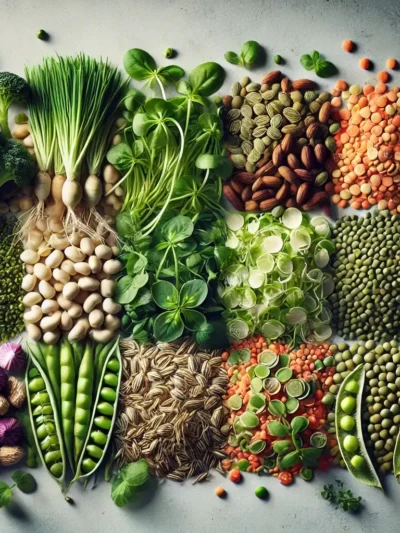Legumes are an extremely versatile and nutritionally dense food group that play a key role in a healthy, balanced diet.
These foods, which include beans, peas, lentils, chickpeas and soybeans, are rich in proteins, fibers, minerals and vitamins essential for our well-being.
Legumes are considered one of the main sources of vegetable protein, being an excellent alternative for those looking to reduce their consumption of proteins of animal origin.
Additionally, they are rich in complex carbohydrates, which provide energy gradually and sustainably, helping to keep blood sugar levels stable.
Its high fiber content also contributes to the health of the digestive system, promoting intestinal regularity and helping with weight control.
What are Legumes?

Legumes are a group of nutrient-rich plant foods that include beans, lentils, peas, chickpeas, soybeans, and many others.
These foods come from plants in the Fabaceae family, which are known for their pods containing edible seeds.
Legumes are considered one of the richest plant sources of protein, in addition to containing a large amount of fiber, vitamins, minerals and antioxidants essential for health.
Unlike other groups of plants, legumes have the ability to fix atmospheric nitrogen, making them excellent crops for soil fertility.
This feature also makes them an important sustainable and ecological option in food, since its cultivation requires less use of chemical fertilizers.
Furthermore, legumes come in a wide variety of shapes, sizes, colors and flavors, which makes them very versatile in cooking.
They can be consumed in a variety of ways, as whole grains, in soups, salads, pâtés, purees and even in sweet preparations.
Nutritional Benefits of Legumes
Legumes are true “superpowers” when it comes to essential nutrients for health.
These foods are rich in a wide variety of beneficial vitamins, minerals and phytochemicals, making them considered one of the most complete sources of nutrients found in nature.
Its high content of high-quality proteins stands out, with essential amino acids that help strengthen muscles and maintain a balanced diet.
Additionally, legumes are excellent sources of fiber, which promotes intestinal health, appetite regulation and the prevention of chronic diseases.
Another crucial benefit is the high content of complex carbohydrates, which provide sustained energy and help stabilize blood sugar levels.
- See studies on legume consumption:
Antioxidants also stand out, which fight free radicals and protect cells against oxidative damage, thus reducing the risk of various diseases.

Types of Common Legumes
Legumes are a large family of vegetables that include a wide variety of types and species. Some of the most common and popular legumes in Brazilian and world cuisine include:
- Bean – Perhaps the best-known and most widely consumed legume in Brazil, beans are available in several varieties, such as black, carioca, red, white, among others. Rich in protein, fiber and essential minerals.
- Chickpea – Very popular in Middle Eastern and Mediterranean cuisine, chickpeas are an excellent source of protein and also contain fiber, vitamins and minerals important for health.
- Pea – A versatile legume that can be eaten fresh, frozen or dried. Rich in protein, fiber, vitamins and minerals, peas are great for adding to soups, salads and main dishes.
- Lentil – Another extremely nutritious legume, lentils are a great source of vegetable protein, fiber, iron and other essential nutrients. They can be prepared in many different ways, such as in soups, purees and salads.
- Soy – Soybeans are one of the most versatile and widely consumed legumes in the world. They can be consumed in many different ways, such as grains, tofu, tempeh, soy milk, among others. They are rich in protein, fiber, vitamins and minerals.
Protein-Rich Legumes
Legumes are great sources of vegetable protein, ideal for those looking for a healthy and balanced diet.
Some of the most protein-rich legumes include beans, lentils, chickpeas, peas, and soybeans.
These foods contain all the essential amino acids, making them excellent meat substitutes in a vegetarian or vegan diet.
The protein content of legumes varies, but in general they have between 20 and 30% of proteins in their composition.
In addition, legumes are rich in fiber, vitamins, minerals and other nutrients that are important for health.
Including them regularly in your diet is an excellent way to ensure an adequate supply of high-quality proteins, especially for those who do not consume products of animal origin.
Fiber-Rich Legumes
Legumes are excellent sources of dietary fiber, essential for intestinal health and weight control.
Beans, lentils, peas and chickpeas are some examples of legumes that are extremely rich in fiber. These fibers help regulate intestinal transit, promoting a feeling of fullness and preventing constipation.
Furthermore, the fibers present in legumes help to reduce blood cholesterol levels, helping to prevent cardiovascular diseases.
They also help control blood sugar levels, as they slow down the absorption of carbohydrates, preventing sudden spikes in blood sugar.
Including fiber-rich legumes in your diet daily is an excellent strategy for improving gut health, controlling weight and reducing the risk of chronic diseases.
Try adding beans, lentils or chickpeas to soups, salads, rice and other dishes.
Legumes and Weight Control
Legumes play a fundamental role in weight control due to their balanced nutritional composition.
They are rich in fiber, protein and complex carbohydrates, which contribute to satiety and help regulate blood sugar levels.
Furthermore, legumes have a low glycemic index, which means they are digested slowly, keeping you feeling full for longer.
Studies have shown that regularly including legumes in the diet is associated with lower total calorie intake and a lower tendency to gain weight over time.
This is because legumes are nutritious and filling foods, which can help reduce overeating and control appetite.
Furthermore, legumes are rich in fiber, which plays an important role in regulating intestinal transit and increasing the feeling of satiety.
Legumes and Cardiovascular Health

Legumes play a key role in promoting cardiovascular health.
Packed with fiber, plant-based protein, vitamins, and minerals, these powerhouse foods help regulate cholesterol levels, lower blood pressure, and keep your heart healthy.
Scientific studies have shown that regular consumption of legumes is associated with a significant reduction in the risk of heart disease.
This is partly due to the ability of legumes to reduce LDL (bad cholesterol) levels and increase HDL (good cholesterol) levels, balancing the lipid profile.
Additionally, legumes are rich in antioxidants and soluble fiber, which help control blood sugar levels and inflammation, both risk factors for cardiovascular problems.
Its high potassium concentration also contributes to maintaining healthy blood pressure.
Legumes and Gut Health
Legumes play a fundamental role in the health of our digestive system. Rich in soluble and insoluble fiber, they help regulate intestinal transit, promoting good bowel function.
The fibers present in legumes act as prebiotics, stimulating the growth of beneficial bacteria in the intestinal microbiota.
Furthermore, legumes contain bioactive compounds, such as oligosaccharides, which act as food for the bacteria in the intestine, strengthening their diversity and balance.
This balance of microbiota is essential for the health and proper functioning of the digestive system, preventing problems such as constipation, diarrhea and colic.
Studies show that regularly including legumes in the diet is associated with a lower incidence of intestinal diseases, such as irritable bowel syndrome and Crohn's disease.
Therefore, consuming legumes is an excellent strategy for maintaining a healthy intestine and preventing gastrointestinal problems.
Tips for Including More Legumes in Your Diet

Including more legumes in your diet can be a simple and effective way to improve your overall health.
However, many people may feel intimidated about how to incorporate them into their diet on a regular basis. Luckily, there are several easy tips that can help you include more of these powerhouse foods in your daily meals.
- Start Slowly – You don’t have to change your diet drastically. Start by adding a serving of legumes, such as beans, peas or lentils, to some of your weekly meals. Gradually increase the amount and frequency until you get used to the taste and texture.
- Try New Recipes – There are countless creative ways to incorporate legumes into tasty dishes, such as soups, salads, pâtés, risottos and even desserts. Look for inspiring recipes online or in cookbooks or our recipe categories to expand your repertoire.
- Make Preparations in Large Batches – When making a dish with legumes, prepare a larger portion than you need. This way, you will have leftovers for quick meals during the week, making it easier to include these foods in your daily diet.
- Enjoy the Convenience of Canned Options – Canned legumes, such as chickpeas, beans, peas and lentils, are a great option when you need a quick meal. They are practical, nutritious and can be easily added to a variety of dishes.
- Try Tasty Combinations – Legumes pair wonderfully with other foods, such as rice, vegetables, herbs, and spices. Explore different combinations to find flavors that you truly enjoy.
By following these simple tips, you can incorporate more legumes into your diet in a healthy, tasty and sustainable way.
Remember to be patient with yourself during the process and the reward will be a lifestyle more balanced and improved health.









